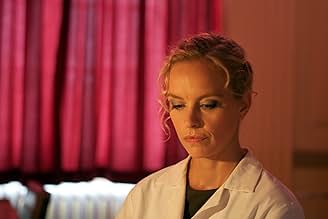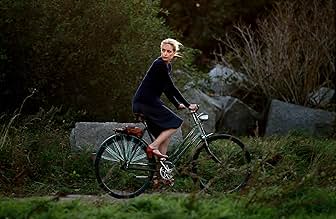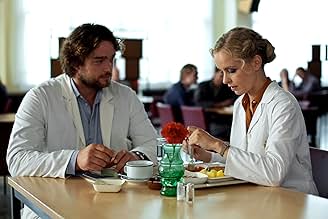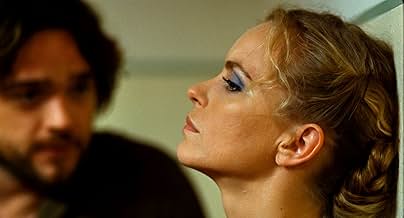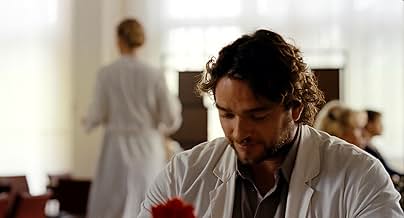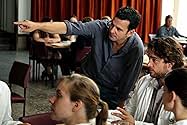Barbara
- 2012
- Tous publics
- 1h 45min
NOTE IMDb
7,2/10
17 k
MA NOTE
Une femme médecin travaillant dans les années 1980 en Allemagne de l'Est se retrouve bannie dans un petit hôpital de campagne.Une femme médecin travaillant dans les années 1980 en Allemagne de l'Est se retrouve bannie dans un petit hôpital de campagne.Une femme médecin travaillant dans les années 1980 en Allemagne de l'Est se retrouve bannie dans un petit hôpital de campagne.
- Réalisation
- Scénario
- Casting principal
- Récompenses
- 10 victoires et 24 nominations au total
Claudia Geisler-Bading
- Stationsschwester Schlösser
- (as Claudia Geisler)
Avis à la une
Barbara (2012)
A somber, tightly scripted, almost old-fashioned film. I can picture this in black white, or a movie not only set in 1980 but shot then, too. I mean this all as a compliment.
It's key to know that this is Communist East Germany, a closed country under Soviet influence and generally struggling to keep up with West Germany. The doldrums depicted, and the lower quality of medical care at this small provincial clinic, are very real.
The title character is a downtrodden doctor who was caught trying to escape to the West, and was sent to the boondocks as punishment. And she is periodically searched by the authorities, who go through her apartment, her body cavities, her entire personal life while she passively waits. It's awful. And very real.
There is a steady vague story line showing Barbara's contacts to sympathetic Germans, and it seems one or two of them are visiting now and then from the West. Clandestine meetings with money (and sex) continue in the woods, but these are minor points in her steady work as a doctor in the clinic.
More important, it turns out, is the cute and steady-handed male doctor who runs the clinic. She doesn't trust him. If he asks questions out of curiosity she isn't sure if he's a spy or just a nice guy. We aren't sure either. His life is simple and has simple pleasures, and he likes her and tries to make her open up and actually smile, which turns out to be the hardest thing in the whole movie.
Barbara's plans to escape seem to be threatened by her job commitment, which she can't shirk because it'll draw attention to her irregularities. And so things go in this windy, North German countryside. It's so beautifully, patiently wrought, you have to watch and wait, just as passively as Barbara. It's sad, for sure, and yet there are these small glimmers. For one thing, there is the idea that no matter what your circumstances there is always the ability to be good and to do good. The male doctor is the example of this, and Barbara begins to see something more genuine at work than her own superficial (we assume) strivings for a consumerist West.
It's odd to see such a balanced and yet truthful view of Communist Germany. The oppression is real and bad, but the strivings of regular people (doctors and others) make hope possible. I loved this movie, even though fairly little happens, and there are few turns of the plot that are clearly for dramatic impact more than an integral building of character. But these are small caveats. The total effect is simple and penetrating, with a beautiful ending.
A somber, tightly scripted, almost old-fashioned film. I can picture this in black white, or a movie not only set in 1980 but shot then, too. I mean this all as a compliment.
It's key to know that this is Communist East Germany, a closed country under Soviet influence and generally struggling to keep up with West Germany. The doldrums depicted, and the lower quality of medical care at this small provincial clinic, are very real.
The title character is a downtrodden doctor who was caught trying to escape to the West, and was sent to the boondocks as punishment. And she is periodically searched by the authorities, who go through her apartment, her body cavities, her entire personal life while she passively waits. It's awful. And very real.
There is a steady vague story line showing Barbara's contacts to sympathetic Germans, and it seems one or two of them are visiting now and then from the West. Clandestine meetings with money (and sex) continue in the woods, but these are minor points in her steady work as a doctor in the clinic.
More important, it turns out, is the cute and steady-handed male doctor who runs the clinic. She doesn't trust him. If he asks questions out of curiosity she isn't sure if he's a spy or just a nice guy. We aren't sure either. His life is simple and has simple pleasures, and he likes her and tries to make her open up and actually smile, which turns out to be the hardest thing in the whole movie.
Barbara's plans to escape seem to be threatened by her job commitment, which she can't shirk because it'll draw attention to her irregularities. And so things go in this windy, North German countryside. It's so beautifully, patiently wrought, you have to watch and wait, just as passively as Barbara. It's sad, for sure, and yet there are these small glimmers. For one thing, there is the idea that no matter what your circumstances there is always the ability to be good and to do good. The male doctor is the example of this, and Barbara begins to see something more genuine at work than her own superficial (we assume) strivings for a consumerist West.
It's odd to see such a balanced and yet truthful view of Communist Germany. The oppression is real and bad, but the strivings of regular people (doctors and others) make hope possible. I loved this movie, even though fairly little happens, and there are few turns of the plot that are clearly for dramatic impact more than an integral building of character. But these are small caveats. The total effect is simple and penetrating, with a beautiful ending.
BARBARA may be a little too slow and humorless for many tastes, but it's one of those films that's so real it hardly seems like a film at all. You have to admire the stark realism here. Whether you want to go there or not, this film truly takes you to a secluded province of East Germany, 1980. BARBARA affords an acute look at the inside of a totalitarian state. While it doesn't show a whole lot in this regard, what it does is shown most effectively. The lack of any soundtrack--something I didn't even notice while viewing but that one of the reviews on Amazon pointed out--only adds to BARBARA's immediacy. Quietly immersing, with a real surprise at the end. Excellent cinematography and fine acting by all.
Yes, I worked in the old DDR. Living in London, and being a graduate engineer able to speak German, I was hired by a company importing machinery from the DDR to be their liaison man at the factory in East Berlin, and spent a number of lengthy periods over there in the late 60s and early 70s. I very much settled into working life there, and would socialise with the other engineers at the factory. I even had a local girlfriend for a while!
I recall the mindless bureaucracy, the often petty limitations on what everyone could do, and of course the ubiquitous police presence. In order to have my car to get around during these long tours of duty, I would usually take the ferry and drive there, and on one occasion I got harangued by a cop who told me my car was too dirty and that having a dirty car was strictly forbidden in the DDR!!
This movie depicts an era a decade later, and some things had changed. I remember many older people expressing considerable enthusiasm for their 'socialist utopia', largely because they felt their lives were massively better than under the Nazis and during the war years. But there was also a rising generation who wanted what people in the west had, a desire which had a particularly curious form of expression in Levi jeans! These were like gold dust, and sometimes at weekends I would pop through Checkpoint Charlie into West Berlin, and buy half a dozen pairs to give to my friends. Barbara and André were very much of that generation, Schütz was distinctly of the old guard.
So for me, the movie played out against a familiar background, and the agonising personal decisions this forced upon the central characters had great reality. Both Barbara and André were portrayed very much as caring doctors, placed in intolerable situations by the heavy and unfeeling hand of the state. The movie very cleverly kept us all in the dark, as we speculated how it might end. Well worth watching to find out!
10yagian
I visited Eastern Europe, Berlin, Prague, and Budapest, in March 1990. At that time, the Berlin Wall had already been fallen down, but Germany had not reunited yet.
People could freely come and go over the borders between East and West Germany. I went through Checkpoint Charlie to East Berlin, and I visited retro-future TV tower and saw Ladas running on street.
In a night train from Berlin to Prague, I asked a passenger who sat next to me if Germany would reunite in a year, and he answered that he didn't believe it would happen so early. In fact, Germany reunited in October 1990.
Although I actually visited East Berlin, now, it is hardly for me to believe that the half of Germany was a communist state just twenty-three years ago.
--------------------
"Barbara" is a German film about people living in East Germany in 1980. Barbara is a female doctor, who was watched by the secret police.
It is one of the greatest German films that I have ever seen. There is no exaggeration and omission in this film. Every element in it is necessary, and I couldn't find that any things were unnecessary.
This film is very quiet, because there is no background music. That makes audience concentrated in every tiny sound. Barbara was always nervous about the secret police, so she got surprised when the doorbell started to ring, and the audience also got really surprised with the sound of the doorbell, and fully understood her emotion.
Nina Hoss, as Barbara, was also great and attractive. She didn't overplay at all, but accurately expressed how Barbara felt in her mind. After seeing her performance, most actors and actress became to look unnatural.
This film is a quiet, simple, and elegant. If you love films, I strongly recommend you to see it.
People could freely come and go over the borders between East and West Germany. I went through Checkpoint Charlie to East Berlin, and I visited retro-future TV tower and saw Ladas running on street.
In a night train from Berlin to Prague, I asked a passenger who sat next to me if Germany would reunite in a year, and he answered that he didn't believe it would happen so early. In fact, Germany reunited in October 1990.
Although I actually visited East Berlin, now, it is hardly for me to believe that the half of Germany was a communist state just twenty-three years ago.
--------------------
"Barbara" is a German film about people living in East Germany in 1980. Barbara is a female doctor, who was watched by the secret police.
It is one of the greatest German films that I have ever seen. There is no exaggeration and omission in this film. Every element in it is necessary, and I couldn't find that any things were unnecessary.
This film is very quiet, because there is no background music. That makes audience concentrated in every tiny sound. Barbara was always nervous about the secret police, so she got surprised when the doorbell started to ring, and the audience also got really surprised with the sound of the doorbell, and fully understood her emotion.
Nina Hoss, as Barbara, was also great and attractive. She didn't overplay at all, but accurately expressed how Barbara felt in her mind. After seeing her performance, most actors and actress became to look unnatural.
This film is a quiet, simple, and elegant. If you love films, I strongly recommend you to see it.
This brilliant German film explores two fundamental questions: whether it is possible to collaborate with a fundamentally oppressive state, and the acute degree of personal loneliness felt by those who cannot, and whom the state thereby treats as its enemies. The mundane depersonalisation of life under the Stasi is captured much more acutely, it seems to me, in this story than in the more acclaimed 'The Lives of Others'; that the leading collaborator is arguably a decent and attractive person, albeit one who has made different choices to the admirable but not wholly likable heroine, adds subtlety and humanity to the overall portrait of society. Both protagonists are excellent in their roles; the camera-work captures the underlying feelings of alienation in a way that reminded me of early Kieslowski. 'Barbara' is by turns bleak, poetic, emotional and thought-provoking: it deserves to be more widely known.
Le saviez-vous
- AnecdotesThe Torgau workhouse to which Stella is sent is the Torgau Juvenile Detention Centre. The Centre, which ran from 1964 to 1989, was for the "re-education" of young people aged 14 to 18. Inmates had committed no crimes, but were deemed to need education so that they could fit in with the norms of socialist life in East Germany.
- GaffesAndre hands Barbara a cup of coffee, which she promptly drops. You see the shattered pieces of the cup on the floor, but no coffee.
- Citations
André: Doctor Wolff will be working with us. She is from Berlin... from the Charite Hospital, and has decided...
Assistenzärztin Schulze: We have introduced ourselves.
- ConnexionsFollowed by Phoenix (2014)
- Bandes originalesNocturne g-moll Opus 15 No. 3
Composed by Frédéric Chopin
Meilleurs choix
Connectez-vous pour évaluer et suivre la liste de favoris afin de recevoir des recommandations personnalisées
- How long is Barbara?Alimenté par Alexa
Détails
- Date de sortie
- Pays d’origine
- Sites officiels
- Langue
- Aussi connu sous le nom de
- Bárbara
- Lieux de tournage
- Sociétés de production
- Voir plus de crédits d'entreprise sur IMDbPro
Box-office
- Montant brut aux États-Unis et au Canada
- 1 013 902 $US
- Week-end de sortie aux États-Unis et au Canada
- 63 410 $US
- 23 déc. 2012
- Montant brut mondial
- 6 908 277 $US
- Durée
- 1h 45min(105 min)
- Couleur
- Mixage
- Rapport de forme
- 1.85 : 1
Contribuer à cette page
Suggérer une modification ou ajouter du contenu manquant



